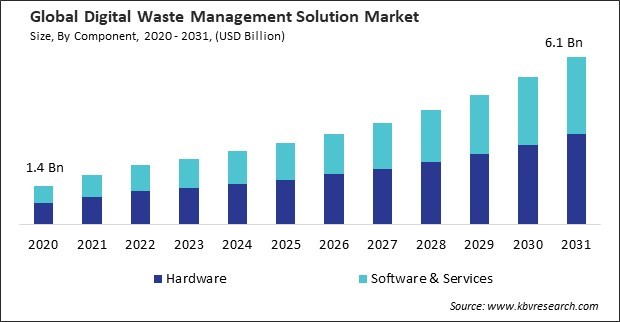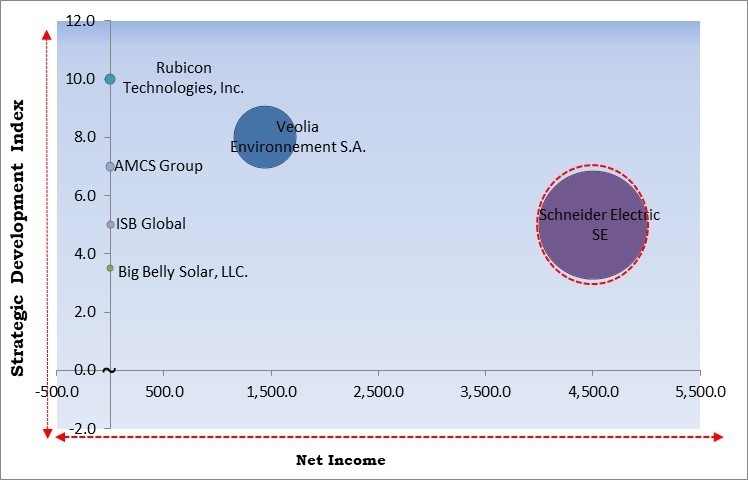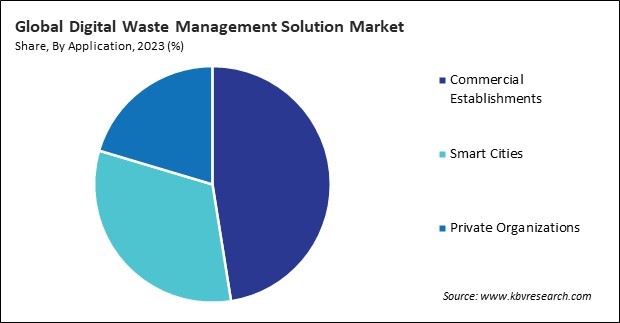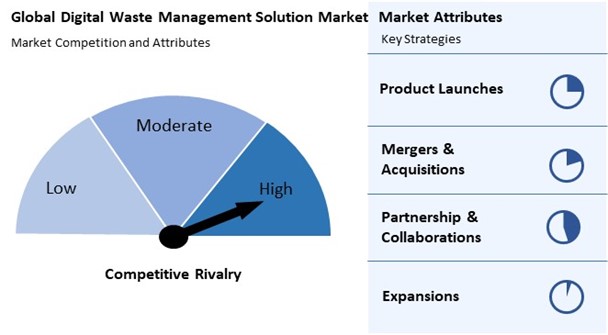“Global Digital Waste Management Solution Market to reach a market value of 6.1 Billion by 2031 growing at a CAGR of 12.5%”
The Global Digital Waste Management Solution Market size is expected to reach $6.1 billion by 2031, rising at a market growth of 12.5% CAGR during the forecast period.
North America, especially in the United States and Canada, is experiencing rapid urbanization. With more people moving into cities, managing waste efficiently becomes increasingly critical. Digital waste management solutions help smart cities handle the growing volume of waste and optimize collection and disposal processes. North American cities are investing in smart infrastructure, including waste management systems, as part of broader smart city initiatives. These investments aim to improve operational efficiency, reduce costs, and enhance waste management services’ effectiveness. Thus, the North America region witnessed 38% revenue share in the digital waste management solution market in 2023.

The major strategies followed by the market participants are Partnership as the key developmental strategy to keep pace with the changing demands of end users. For instance, Schneider Electric SE announced the partnership with Digital Realty, the largest global provider of cloud and carrier-neutral data center, colocation, and interconnection solutions, and launched a circular economy initiative at the Paris 5 (PAR5) data center, focusing on extending the life of critical systems, including Schneider's LV and MV equipment. The project supports ESG goals by reusing infrastructure, reducing e-waste, and cutting Scope 3 emissions and GHGs like SF6.
Based on the Analysis presented in the KBV Cardinal matrix; Schneider Electric SE is the forerunner in the Digital Waste Management Solution Market. Companies such as Rubicon Technologies, Inc. Veolia Environnement S.A. c-trace GmbH AMCS Group are some of the key innovators in Digital Waste Management Solution Market. In February, 2024, Rubicon Technologies, Inc. teamed up with The City of Phoenix, Arizona, a company with a strong focus on innovation and sustainability to enhance its solid waste collection using innovative smart city technology. This aims to improve efficiency, effectiveness, and sustainability in waste operations, reflecting a shared commitment to advancing smarter, more sustainable urban communities.

Digital waste management solutions enable real-time data collection and analytics, providing municipalities with insights into waste generation patterns, disposal trends, and recycling rates. This data-driven approach helps make informed decisions, improve waste management strategies, and adapt to changing waste generation dynamics.
Additionally, Digital waste management systems, including automated sorting technologies and waste analytics platforms, enable more efficient handling of complex waste compositions and improve overall waste management efficiency. Hence, the high amount of waste generation worldwide drives the market's growth.
For smaller municipalities or waste management companies, the costs of scaling digital waste management solutions to a larger area or more extensive operations can be significant. These entities may find it challenging to justify the expenses of expanding digital technologies across their entire service area, particularly if the financial benefits are unclear. Therefore, high implementation costs are hindering the growth of the market.
On the basis of waste type, the market is segmented into recyclable, non-recyclable, and hazardous. In 2023, the non-recyclable segment attained 27% revenue share in the d market. Non-recyclable waste often requires specialized disposal methods, such as incineration, hazardous waste treatment, or secure landfilling, which can be expensive.
By application, the market is divided into smart cities, commercial establishments, and private organizations. In 2023, the commercial establishment segment registered 47% revenue share in the solution market. Commercial establishments, such as office buildings, shopping malls, hotels, and restaurants, generate significant volumes of waste daily. Managing this waste efficiently requires robust digital solutions to optimize collection, sorting, and disposal processes.

Based on component, the market is classified into software & service and hardware. In 2023, the hardware segment garnered 56% revenue share in the digital waste management solution market. Digital waste management systems require robust hardware infrastructure, including sensors, RFID tags, GPS devices, and smart bins, to efficiently monitor and manage waste collection, transportation, and disposal processes.
Free Valuable Insights: Global Digital Waste Management Solution Market size to reach USD 6.1 Billion by 2031
Region-wise, the solution market is analyzed across North America, Europe, Asia Pacific, and LAMEA. In 2023, the Asia Pacific region generated 29% revenue share in the. Europe has some of the most stringent environmental regulations globally, with policies like the European Green Deal and the Waste Framework Directive pushing cities to adopt sustainable waste management practices.

The digital waste management solution market is highly competitive, driven by increasing environmental regulations and the demand for efficient waste management systems. Key players focus on offering advanced technologies like IoT, AI, and cloud-based platforms to optimize waste collection, recycling, and disposal processes. Attributes like real-time data analytics, scalability, and integration with existing waste management systems are crucial for gaining a competitive edge. The market is also characterized by innovation in sustainability practices and smart city initiatives.
| Report Attribute | Details |
|---|---|
| Market size value in 2023 | USD 2.4 Billion |
| Market size forecast in 2031 | USD 6.1 Billion |
| Base Year | 2023 |
| Historical Period | 2020 to 2022 |
| Forecast Period | 2024 to 2031 |
| Revenue Growth Rate | CAGR of 12.5% from 2024 to 2031 |
| Number of Pages | 227 |
| Tables | 344 |
| Report coverage | Market Trends, Revenue Estimation and Forecast, Segmentation Analysis, Regional and Country Breakdown, Competitive Landscape, Porter’s 5 Forces Analysis, Company Profiling, Companies Strategic Developments, SWOT Analysis, Winning Imperatives |
| Segments covered | Component, Waste Type, Application, Region |
| Country scope |
|
| Companies Included | Schneider Electric SE, Rubicon Technologies, Inc., Veolia Environnement S.A., c-trace GmbH, AMCS Group, Waste Harmonics, ISB Global, Sensoneo j.s.a., Big Belly Solar, LLC. and Evreka |
By Component
By Waste Type
By Application
By Geography
This Market size is expected to reach $6.1 billion by 2031.
Increasing urbanization and population growth are driving the Market in coming years, however, High implementation costs restraints the growth of the Market.
Schneider Electric SE, Rubicon Technologies, Inc., Veolia Environnement S.A., c-trace GmbH, AMCS Group, Waste Harmonics, ISB Global, Sensoneo j.s.a., Big Belly Solar, LLC. and Evreka
The expected CAGR of this Market is 12.5% from 2024 to 2031.
The Recyclable segment is leading the Market by Waste Type in 2023; thereby, achieving a market value of $3.8 billion by 2031.
The North America region dominated the Market by Region in 2023, and would continue to be a dominant market till 2031; thereby, achieving a market value of $2.3 billion by 2031.
Our team of dedicated experts can provide you with attractive expansion opportunities for your business.

 Drivers
Drivers
 Restraints
Restraints
 Opportunities
Opportunities
 Challenges
Challenges
